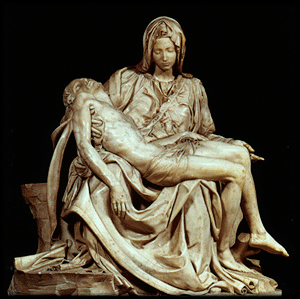
Welcome to the ezine produced by SGI Buddhists that prompts the positive, kindles the constructive, highlights the hopeful and leaves you feeling - well, up!

 Buddhism is well-known as a religion that rejects the idea of gods and supernatural beings. So what is its attitude to Jesus Christ and the resurrection? A personal interpretation by Greg Martin
Buddhism is well-known as a religion that rejects the idea of gods and supernatural beings. So what is its attitude to Jesus Christ and the resurrection? A personal interpretation by Greg Martin
About two years ago, I was sitting at home minding my own business on a Saturday night and I got a call from a member [of the Buddhist group SGI] in California who is a producer of a TV show by Reverend Lawson, who is a Baptist minister in Los Angeles. His guest cancelled for the next day, it's on the Christian channel, and would I fill in?
She said, 'But, before you answer, I should tell you that tomorrow is Easter. He will be asking you "What do the Buddhists think about the Resurrection of Christ?"'
And I said, 'Actually, we don't think about it much at all.'
She said, 'But this would be a great opportunity to make a connection because, you know, Reverend Lawson is actually one of the disciples of Dr [Martin Luther] King and such and knows of us.'
So I said, 'I don't know what I can talk about,' and she said, 'Well, you'll think of something.'
She knows me very well. So, I said okay. So I'm chanting about it and thinking, 'What am I going to do if he asks me a question? What am I going to say?'
I had just finished reading this portion of the 'Dialogue On the Lotus Sutra' and the model of religious faith is Teacher-Student and that we should look at Jesus and his life and his resurrection as a teacher, as a guide, as a role model for our own life, not as someone special that we can't relate to. So, I said, 'Let me boldly go where no Buddhist has gone before and see what happens.'
So I went to the show and we were talking and sure enough, he turns to me and said, 'So, what do the Buddhists think about the crucifixion and the resurrection of Christ?'
And here's what I told him based on the Mentor-Disciple as a model of religious faith for the twenty-first century. First of all, about 15 million households in America get this program, so I'm sure there were a lot of Christians out there going 'Whoa!'
Anyway, so I said, 'Well, my Mentor tells me that the correct model of religious faith should be that of Mentor-Disciple and not God and human being. Therefore, if you look at the life and death of Jesus as a human being and as a role model to teach us about our own life, there are certain implications.
'First of all, he was resurrected. That means life doesn't end with death. There is something out there. We will be reborn. And he was resurrected into really good circumstances, right? He was sitting on the right hand of God, if my Christianity is correct.
Now that's a pretty good circumstance to be reborn in. What earned him the right, this incredible rebirth? How did he earn that?'
And then I said, 'Then we have to look at his life. A couple of conclusions. Number One, living long does not determine how you are reborn. The length of your life is not the point because he didn't live very long.
'Number Two, how much pain you can avoid, how pain-free, cushy your life is, is not the point either because he lived and died difficultly and painfully. Rather we have to look at his life and see that the real message of his life was how he treated other people, especially those who others discounted: the sick, the ill, the disenfranchised, those on the lower echelons of society.
'It's the way he treated his fellow human beings that was the measure of this man. It's because of that that he was reborn into a good circumstance.
'Therefore, for us as Buddhists, we would look at Jesus as a great teacher and we could find wisdom there. We can find the wisdom to understand that how we live this life will determine the next life, whatever that may be. And that the key point is that as we walk through this life we should strive to emulate his behaviour, to be Jesus ourselves, not to worship his power. Therefore, we would regard Jesus as a teacher.'
And he looked me and I thought, 'Uh oh, here it comes.' And he said, 'That's absolutely correct. How did you do that?'
By the way, I had basically the same conversation with Dean Carter [of Dr King's alma mater, Morehouse College] just last weekend, asking the same question, and he said, 'Yeah, that's absolutely correct. Too bad more Christians don't know this.'

